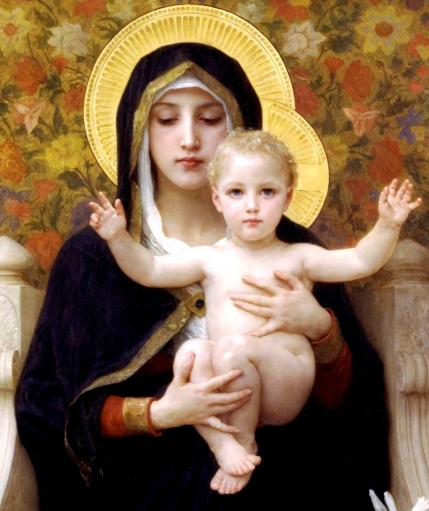September 12th commemorates the Holy Name of Mary, made sacred by the holiness of the Theotokos, the Mother of God, full of grace. It was Pope Innocent XI – a great and holy reforming Pontiff who resisted the Gallican ambitions of Louis XIV (who did not send any help to Vienna), who cleaned up the Vatican, and who condemned abortion, declaring the fetus to have a soul – yes, it was this same great Pope who instituted this feast in 1684, in thanksgiving to the Blessed Mother for the victory at Vienna. In the rather heady days of the late 1960’s, this memorial was removed in the revision of the liturgical calendar after Vatican II, perhaps in some misguided sense of ecumenical outreach and the paring back of devotion. But it was placed back in by Pope Saint John Paul II in 2002, who had a great devotion to the Blessed Mother – totus tuus! – and knew more than most what was, and is still is, at stake. So thank you for that, Holy Father.
As Bernard of Clairvaux puts it in today’s Office, in his own mellifluous manner:
All of you, who see yourselves amid the tides of the world, tossed by storms and tempests rather than walking on the land, do not turn your eyes away from this shining star, unless you want to be overwhelmed by the hurricane. If temptation storms, or you fall upon the rocks of tribulation, look to the star: call upon Mary! If you are tossed by the waves of pride or ambition, detraction or envy, look to the star, call upon Mary. If anger or avarice or the desires of the flesh dash against the ship of your soul, turn your eyes to Mary. If troubled by the enormity of your crimes, ashamed of your guilty conscience, terrified by dread of the judgement, you begin to sink into the gulf of sadness or the abyss of despair, think of Mary.
This day also marks the anniversary of the Battle of Vienna, the great victory in 1683 of the Christians armies, led by Jan Sobieski, against the Ottoman Turks who were determined to conquer the Austrian city, the gateway to the rest of Europe. Against overwhelming odds, the vastly outnumbered Polish, along with forces from Saxony, Franconia, Swabia, Baden and Bavaria, crushed the Muslims under Kara Mustapha Pasha, sending them fleeing for their lives, breaking the power of the Ottoman empire, which had ravaged Christianity and Christians for centuries. Sobieski paraphrased Caesar after what he saw as his miraculous victory: Veni, vidi, Christus vincit. I came, I saw…and Christ conquered. Christ indeed won the day, saving Europe, the Faith and western civilization, at least until recently. There is a legend that the croissant, based the Islamic ‘crescent’, was invented at Viennese bakeries soon afterward, as a symbol of their deliverance.
The religious significance was not lost on the losers: The attacks on America on 9/11 were, in large part, a centuries-delayed Islamic revenge against the ‘Crusaders’. Those perpetrators died in their own fiery inferno. Kara Mustapha met his own demise and judgement almost as quickly, strangled to death by the Janissaries – kidnapped Christian children raised to be fervent Muslim soldiers – for his ignominious defeat.
They hardly need bother with such dramatic mayhem. Islam is now conquering by untrammeled immigration and birthrate. Europe’s refusal to have children, its population stabilized only due to the thousands of foreigners arriving on its shores weekly, now more or less ensures its own eventual suicide, leaving the once-great entity open to an invasion, if one wants to use that term. Not of a military sort, but cultural and demographic. Peruse the 1975 dystopic novel Camp of the Saints for what the near future may hold, and in many ways the present already does. Birmingham, in the industrial heartland of Britain, to take but one case, is now thirty percent Muslim, who will soon be in the majority.
But today we take hope in the victory of Jan Sobieski, who may well have declared Maria vincit, for the name of Mary is powerful indeed, for, as the wedding at Cana signifies, Christ cannot refuse a request from his mother. So ask away, whatever you will. May the Virgin Mary intercede for us all, when we need her help in our own turbulent times. As she said to Juan Diego a century before Vienna, ‘Am I not your Mother?’. So fear not, and have hope. The victory is Christ’s.










